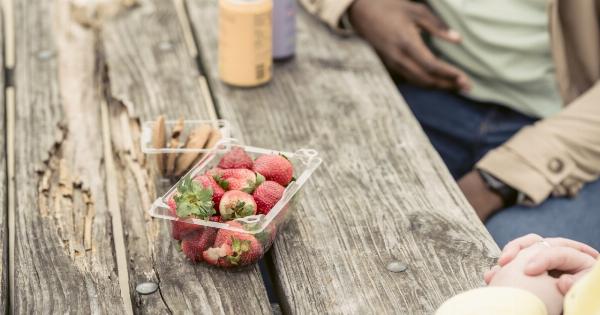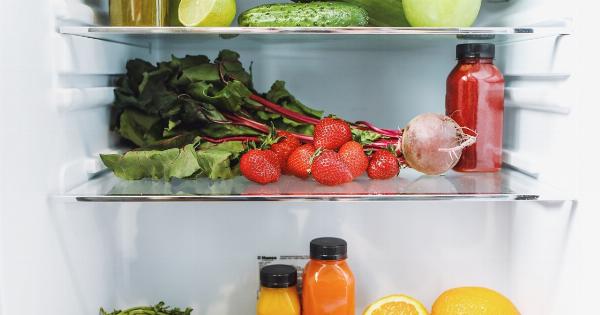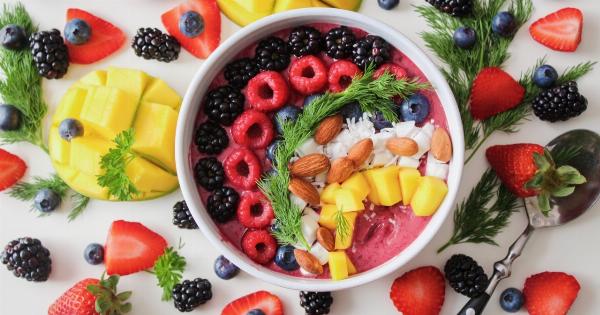Having a refrigerator is a great way to extend the shelf life of your food, but not all foods are meant to be stored for extended periods of time. In fact, certain foods are prone to spoil quickly even when kept in the refrigerator.
Here are 12 such foods that you should consume or use up before they go bad:.
1. Berries
Berries such as strawberries, raspberries, blueberries, and blackberries are delicious and nutritious, but they are also highly perishable. Even in the refrigerator, berries tend to mold and become mushy rather quickly.
To make them last longer, avoid washing them until just before you plan to consume them and store them unwashed in a shallow container lined with paper towels. This will help absorb any excess moisture and prevent them from spoiling quickly.
2. Leafy Greens
Leafy greens like spinach, lettuce, and kale are rich in vitamins and minerals, but they wilt and spoil easily in the refrigerator.
To prolong their freshness, remove any rubber bands or ties, wash and dry the leaves thoroughly, and store them in a resealable bag or an airtight container lined with a paper towel. Additionally, avoid storing leafy greens near ethylene-producing fruits such as apples or bananas, as this can speed up their spoilage.
3. Fresh Herbs
While fresh herbs add a burst of flavor to various dishes, they have a short lifespan in the refrigerator.
To keep herbs like cilantro, parsley, basil, and mint fresh for longer, trim the stems, place them upright in a glass with a little water, and cover them loosely with a plastic bag. Alternatively, you can also wrap them in a damp paper towel and store them in the refrigerator’s crisper drawer.
4. Avocados
Avocados are notorious for ripening quickly, and once ripe, they can turn overripe and spoil within days. To slow down the ripening process, store unripe avocados on the counter.
If you have cut avocados, sprinkle them with lemon or lime juice to prevent browning and store them in an airtight container in the refrigerator. Be sure to consume them within a day or two.
5. Dairy Products
Dairy products, such as milk, yogurt, and cheese, are susceptible to spoilage due to their high moisture content. While these products are meant to be stored in the refrigerator, it is important to consume them before their expiration dates.
Additionally, always check for any signs of mold or unusual odor before consuming them, as they can indicate spoilage.
6. Deli Meats
Deli meats like ham, turkey, and chicken slices are convenient options for sandwiches, but they tend to spoil quickly if not stored properly. To keep deli meats fresh, store them in airtight containers or wrap them tightly in plastic wrap or foil.
It is also important to maintain a refrigerator temperature below 40°F (4°C) to prevent the growth of harmful bacteria.
7. Cooked Rice
While rice is a staple food, cooked rice can become a breeding ground for bacteria if not stored correctly. To prevent spoilage, cool cooked rice quickly and store it in an airtight container in the refrigerator within 1-2 hours of cooking.
Consume the rice within a day or two to reduce the risk of foodborne illnesses.
8. Raw Chicken and Fish
Raw chicken and fish are highly perishable and can become unsafe to eat if stored for too long. It is recommended to use raw chicken and fish within two days of purchase or freeze them for longer storage.
When storing raw chicken and fish in the refrigerator, place them in leak-proof containers or wrap them tightly in plastic wrap to prevent cross-contamination with other foods.
9. Cut Fruits
Cut fruits like melons, pineapples, and citrus fruits should be stored properly to avoid spoilage.
While it may be tempting to leave them in their original cut form, it is important to transfer them to airtight containers or wrap them tightly in plastic wrap. This will help preserve their freshness and prevent them from absorbing odors from other foods in the refrigerator.
10. Sliced Bread
Although bread can be stored at room temperature, sliced bread lasts longer when stored in the refrigerator. However, refrigeration can cause it to become stale more quickly.
To combat this, store sliced bread in a resealable plastic bag, squeeze out any excess air before sealing, and place it in the refrigerator. If you won’t be consuming the bread within a few days, consider freezing it to maintain its freshness for a longer period of time.
11. Leftovers
Leftovers can be a convenient and delicious meal option, but they tend to spoil faster than freshly cooked food. When storing leftovers in the refrigerator, make sure they are properly cooled before transferring them to airtight containers.
Consume the leftovers within 3-4 days, and if in doubt, use your senses to determine if they are still safe to eat.
12. Eggs
Eggs are a common household staple, but they have a limited shelf life. Even though refrigeration can help extend their freshness, it is best to consume eggs within their expiration dates.
To check if an egg is still fresh, perform the float test: place the egg in a bowl of water, and if it sinks and sits horizontally at the bottom, it is fresh. If it stands upright or floats, it is past its prime and should be discarded.

























